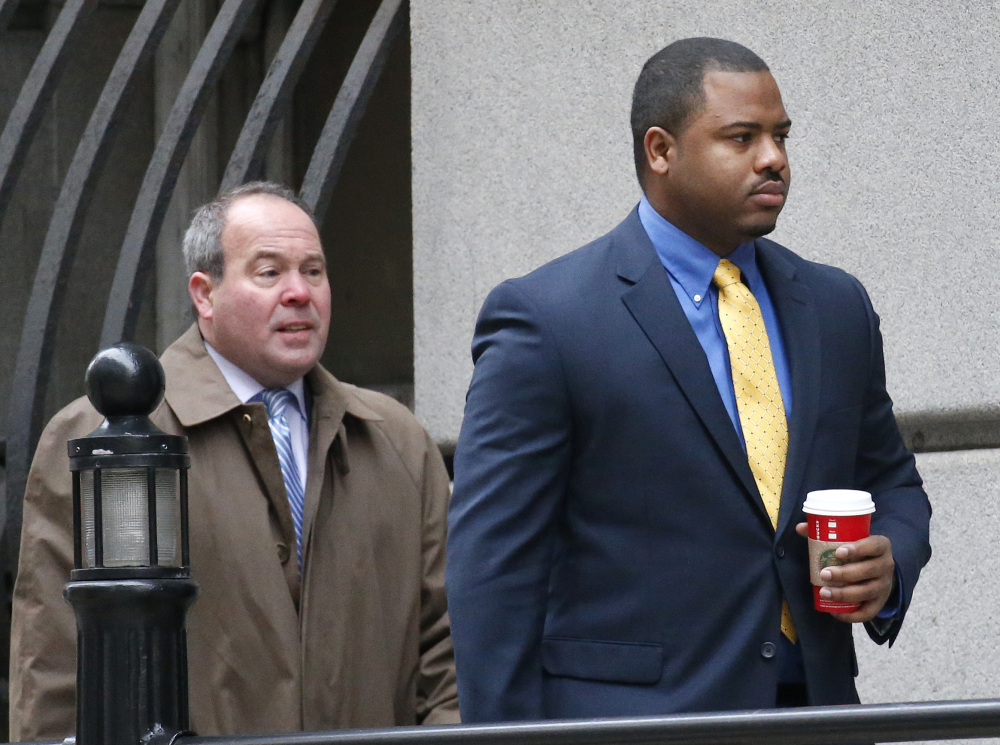BALTIMORE — Baltimore Police Officer William G. Porter took the witness stand in his own defense Wednesday, providing jurors his account of the day Freddie Gray was fatally injured and casting himself as a well-meaning cop who doing his job the best way he knew how.
Porter told jurors that he did not call a medic for Gray because Gray “was unable to give me any reason for why he needed one,” and that he did not buckle the recalcitrant suspect into a police van because he feared he would have to let Gray too close to his gun.
The officer seemed to suggest one of his colleagues was more responsible for Gray’s care, and he talked at length about his own upbringing in the same area that Gray called home. He called the moment he found Gray unresponsive “a very traumatic thing for me also,” because he knew Gray from his job, and said he was “absolutely” sorry for the death.
“Any loss of life, I’m sorry to see that,” Porter said.
The testimony is pivotal, as jurors’ impression of Porter will undoubtedly shape whether they find him guilty of involuntary manslaughter in Gray’s death in police custody. Porter was questioned by his own attorney for about two hours, and prosecutors then cross-examined him.
PORTER FIRST TO GO ON TRIAL
Porter, 26, is one of six city police officers charged in the case and the first to go on trial. Prosecutors have argued he should be held responsible in the April 12 incident because he failed to properly buckle Gray into a police van and did not get Gray medical attention after the 25-year-old asked for a medic and said, “I can’t breathe.” Gray died a week later.
The trial comes as police agencies across the nation grapple with how to convince the public that the legal system can provide justice when its own are accused of wrongdoing. After Gray’s death, protests and riots erupted in Baltimore, and many fear the outcome of Porter’s case could provoke a similar result.
Wearing a gray suit and a navy blue tie, Porter appeared relaxed as he described his upbringing, his previous encounters with Gray and what he did on the day Gray was fatally injured. His testimony sometimes appeared rehearsed, and the officer occasionally repeated statements almost verbatim.
When Porter tried to explain why he didn’t immediately seek medical attention for Gray, Gray’s family members, seated in the courtroom, shook their heads. The officer sparred with Baltimore Chief Deputy State’s Attorney Michael Schatzow on cross examination, especially after Schatzow asked him if the same “no snitching” culture exists among rank-and-file police officers, as Porter testified earlier it did on the streets of Baltimore.
SAW GRAY ‘ON DAILY ROUTINE’
“Is that culture in the Baltimore police department?” Schatzow asked.
“Absolutely not,” Porter replied. “I’m offended you would even say something like that.”
At several points Porter appeared exasperated but did not lose his temper.
Porter testified that he “saw Gray on a daily routine,” and the two had a “mutual respect for each other.” But he also said Gray had a reputation for misleading authorities about injury, and just two weeks before the April 12 encounter, Gray attempted to kick out a window of a police SUV after he was detained.
“He would usually act out and yell and feign an injury,” Porter said of Gray.
On April 12, Porter said he did not see Gray arrested after he ran from police, but he heard the encounter. Gray, he testified, was yelling and telling officers, “I can’t breathe, I need an inhaler.” Porter said he saw Gray kicking as he was put in a police van.
“I can see the wagon shaking side to side,” Porter testified.
Porter said when he checked on Gray later in the van, he saw no cause for concern. Gray, he said, showed no cuts, bruises or other signs of physical injury. He disputed the notion that Gray claimed in the police van that he couldn’t breathe, and argued a police investigator’s previous testimony that Porter had told her as much was the product of a misunderstanding
“She got that wrong,” Porter insisted. Under Schatzow’s cross-examination, he conceded that if Freddie Gray had said he could not breathe, that would be reason to seek help.
Porter testified he did not call for a medic because Gray “was unable to give me any reason for why he needed one.” He said he asked Gray if he needed help because it was “taking way too long” to get him to jail, and he believed Gray “was acting out.”
Also importantly, Porter seemed to cast another officer charged in the case – Caesar Goodson – as bearing more responsibility for handling Gray. Goodson was driving the van in which Gray was being transported and has been charged with second-degree murder in the case.
Porter testified it was customarily understood that a prisoner was under the control of the van driver, and that it would be quicker than calling a medic to let Goodson take Gray to the hospital. Asked by Schatzow why he didn’t tell Goodson to drive Gray to the hospital, Porter responded: “There’s a hierarchy. I can’t tell Officer Goodson what to do.”
Send questions/comments to the editors.



Success. Please wait for the page to reload. If the page does not reload within 5 seconds, please refresh the page.
Enter your email and password to access comments.
Hi, to comment on stories you must . This profile is in addition to your subscription and website login.
Already have a commenting profile? .
Invalid username/password.
Please check your email to confirm and complete your registration.
Only subscribers are eligible to post comments. Please subscribe or login first for digital access. Here’s why.
Use the form below to reset your password. When you've submitted your account email, we will send an email with a reset code.